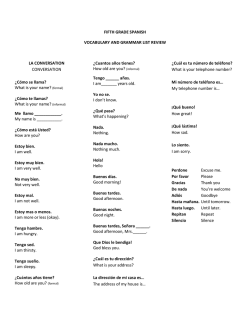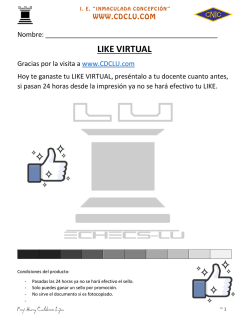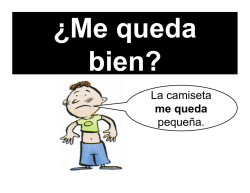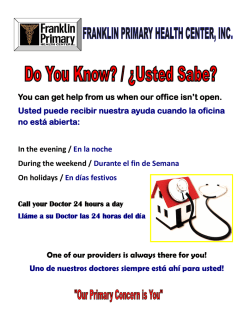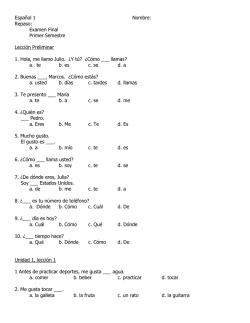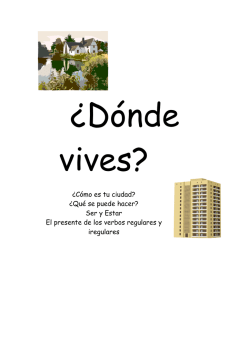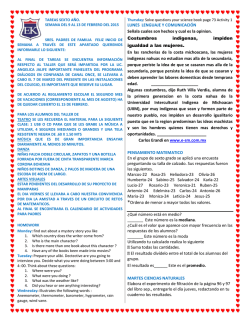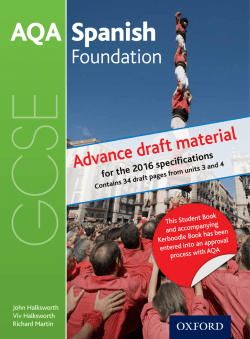
Spanish 1 Finals Review Packet - Stjohns
Nombre______________________ Spanish 1 Finals Review Packet Part 1: Regular Present Tense Verbs AR endings Yo à Nosotros à Tú à Él à Ellos à Infinitive ayudar bailar buscar cantar contestar enseñar entrar escuchar esperar estudiar Yo à Tú à Él à ER endings Nosotros à Ellos à Meaning _______________ _______________ _______________ _______________ _______________ _______________ _______________ _______________ _______________ _______________ Yo à Tú à Él à IR endings Nosotros à Ellos à Infinitive explicar hablar llegar mirar necesitar pasar preguntar sacar trabajar usar Meaning _______________ _______________ _______________ _______________ _______________ _______________ _______________ _______________ _______________ _______________ Part 2: GUSTAR – to like something / an action / a noun A mí me gusta(n) A ti te gusta(n) A él le gusta(n) A ella le gusta(n) A Usted le gusta(n) I Like You Like He She You A nosotros nos gusta(n) We A ellos les gusta(n) A ellas les gusta(n) A Ustedes les gusta(n) They (masculine) They (feminine) You all Note: • USE GUSTAN: If what you like is plural • USE GUSTA: If what you like is singular or is an action (verb) Examples: A mí me gustan las papas fritas. I like french fries. A mi me gusta el helado. I like ice cream. 1. A mi hijo no ___________________________ los aguacates. 2. Al chico ___________________________ bucear en el mar. 3. A nosotros no ___________________________ el estrés. 4. A los bebés___________________________ los animalitos de felpa. 5. A mí ___________________________ jugar al béisbol. 6. A Luís y a mí ___________________________ la montaña rusa. 7. A ti ___________________________ los videojuegos. 8. A los gatos ___________________________ beber leche. 9. A ellos ___________________________ el jugo de piña. 10. ¿A quién ___________________________ los girasoles? Part 3: Stem Changing Verbs There are four kinds of stem changing verbs: ____________ ____________ ____________ ____________ Pensar Yo Tú Él/Ella/Ud. __________________ Nosotros __________________ __________________ __________________ Uds./Ellos __________________ Dormir Yo Tú Él/Ella/Ud. __________________ Nosotros __________________ __________________ __________________ Uds./Ellos __________________ Servir Yo Tú Él/Ella/Ud. __________________ Nosotros __________________ __________________ __________________ Uds./Ellos __________________ Jugar Yo Tú Él/Ella/Ud. __________________ Nosotros __________________ __________________ __________________ Uds./Ellos __________________ Fill in the blanks with the conjugated form of the verb. 1. Tú _____________________ (jugar) el baloncesto. 2. Las profesoras _____________________ (querer) vacaciones de verano. 3. ¿ _____________________ (preferir) usted la langosta? 4. Nosotros __________________ (entender) los ejercicios. 5. Felipe y Juan______________________ (empezar) las prácticas gramáticas. 6. Ellos _______________(querer) almorzar. 7. La chica __________________ (poder) ir al centro comercial para ir de compras. 8. ¿Qué________________ (pensar)? 9. Sofía ______________________ (entender) a Julio. 10. Yo no __________________ (querer) la ensalada. Part 4: Ser vs. Estar SER: ESTAR: C: P: O: L: T: A: T: C: O: E: N: Use the correct form of SER or ESTAR to form the following sentences: I am sick. _________________________ I am from Maryland. _________________________ She is tall. _________________________ He is in class. _________________________ We are students. _________________________ It is 11:24 am. _________________________ You are happy. _________________________ Part 5: Articles The definite articles are: Masculine Singular ____________ Masculine Plural ____________ Feminine Singular ____________ Feminine Plural ____________ The indefinite articles are: ____________ ____________ ____________ ____________ Part 6: Irregular Verbs & YO-GO Verbs Tener, Venir, Hacer, Traer, Decir, Poner, Salir, Estar, Dar, y Ser ____________ I have ____________You come ____________He does ____________She makes ____________They bring ____________ ____________ ____________ ____________ ____________ He says ____________I am from They put ____________I go out He is _years old ___________ We make I feel (am) ____________They say She gives ____________We give Yo form Tengo Tú ___________ Él ___________ Nosotros ___________ Ellos ___________ Vengo ___________ ___________ ___________ ___________ Hago ___________ ___________ ___________ ___________ Traigo ___________ ___________ ___________ ___________ Digo ___________ ___________ ___________ ___________ Pongo ___________ ___________ ___________ ___________ Salgo ___________ ___________ ___________ ___________ Write down any questions that you still have to review this week: Answer the following questions in a complete sentence in Spanish. 1. ¿Cómo te llamas? _____________________________________________________________ 2. ¿Cómo estás? _____________________________________________________________ 3. ¿Cómo eres? _____________________________________________________________ 4. ¿Cuántos años tienes? _____________________________________________________________ 5. ¿Cuál es tu clase favorita? ¿Por qué? _____________________________________________________________ 6. ¿De dónde eres? _____________________________________________________________ 7. ¿Cuál es tu comida favorita? ¿Por qué? _____________________________________________________________ 8. ¿Qué comes para el desayuno? _____________________________________________________________ 9. ¿Qué te gusta hacer durante los fines de semana? _____________________________________________________________ 10. ¿Qué llevas durante la primavera? _____________________________________________________________ 11. ¿Dónde almuerzas? _____________________________________________________________ What is the meaning of the following question words? ¿Cuánto/a/s? _____________________ ¿Qué? _____________________ ¿Por qué? _____________________ ¿Quién? _____________________ ¿Cuándo? _____________________ ¿Dónde? _____________________ A. Translate the question into Spanish, then answer in a complete sentence in Spanish. 1. What’s your dad like ? 2. What do you eat for breakfast ? 3. What is your best friend (meilleur ami) like? 4. What would you like for your birthday? 5. Where are your teeth? 6. How old are you? 7. Are you hungry? 8. Are you thirsty? Números- Write the following numbers 1 40 71 5 49 80 10 50 82 20 53 90 21 60 94 30 68 100 37 70 573 La hora 1. It is one o’clock. 2. It is 4:30. 3. It is 5:15. 4. It is 6:45. 5. It is 11:20. 6. It is noon. 7. It is midnight. La Fecha- Write the day of the week and the month in French next to the English Monday Saturday April Tuesday Sunday May Wednesday January June Thursday February July Friday March August September October November December Write the following dates out in Spanish. 1. June 15th 2. August 6th 3. May 1st 4. January 30th El tiempo Translate: 1. It’s raining. 2. It’s beautiful. 3. It’s snowing. 4. It’s cold 5. It’s hot/warm. Possessive Adjectives Masculine Yo Tú Él Feminine Plural English XXXXXXX XX Nosotros Singular XXXXXXX XX Ellos XXXXXXX XX Choose the correct verb for the context of the sentence, and conjugate it for the subject. Don’t forget to include a reflexive pronoun. 1. Ellos ____________________________________ a las siete de la mañana. (despertarse/maquillarse) 2. Yo _______________________________________ en la cama. (ducharse/dormirse) 3. Tú ___________________________________________ en una camiseta. (lavarse/vestirse) 4. Nosotros __________________________________ después de ducharse. (secarse/levantarse) 5. Ella _________________________________ las piernas en la ducha. (prepararse/afeitarse) 6. Tú __________________________________________ el pelo cada mes. (cortarse/quitarse) 7. Nosotros ________________________________ los dientes en el baño. (cepillarse/bañarse) 8. Yo _______________________________ la ropa antes de dormirse. (afeitarse/quitarse) Choose the correct verb from the box below and conjugate it in the context of the sentence (2 pts) ir tener jugar volver perder mostrar sentir cerrar comenzar servir pedir estar pensar poder encontrar ser conseguir costar querer preferir 1. Los chocolates ___________________________ $12.50. 2. Yo ____________________________ en la escuela el lunes. 3. Nosotros ________________________________ de Chile. 4. Ella _________________________________ dos gatos y un perro. 5. Ellos ________________________________ el partido de fútbol. 6. Tú ______________________________________ un iPad para tu cumpleaños. 7. Vosotros ___________________________ la puerta en la cocina. 8. El restaurante ___________________________ los tacos y los burritos. 9. Yo ___________________________________ ir a la playa. 10. Nosotros ______________________________ la competición de tenis. Choose the correct possessive adjective 1. (my) _______________ libro 2. (our) ______________ padre 3. (his) _______________ abuelos 4. (my) ______________ primas 5. (her) ______________ familia 6. (my) ______________ familia 7. (y’alls) _______________ gatos 8. (his) ______________ perros 9. (our) ______________tío 10. (our) _____________ tías
© Copyright 2026
